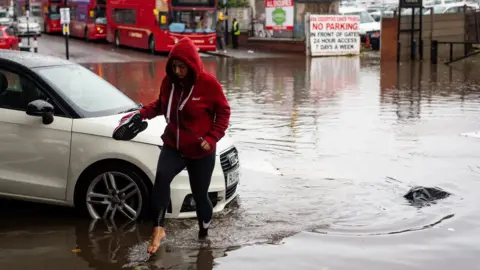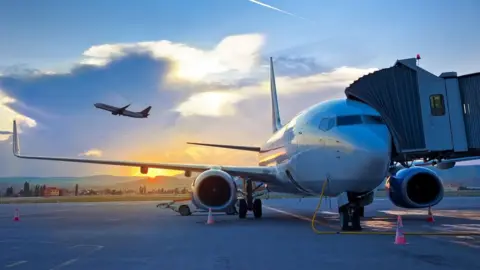Climate change: Big lifestyle changes are the only answer
 PA Media
PA MediaThe UK government must tell the public small, easy changes will not be enough to tackle climate change, warn experts.
Researchers from Imperial College London say we must eat less meat and dairy, swap cars for bikes, take fewer flights, and ditch gas boilers at home.
The report, seen by BBC Panorama, has been prepared for the Committee on Climate Change, which advises ministers how to cut the UK's carbon footprint.
It says an upheaval in our lifestyles is the only way to meet targets.
The government has passed a law obliging the country to cut carbon emissions to net zero by 2050.
It is "going further and faster than any other developed nation to protect the planet for future generations", a government spokesperson told BBC Panorama. "If we can go faster, we will."
But the new report warns major shifts in policy across huge areas of government activity are needed to keep the public onside.
Chris Stark, the Chief Executive of the Committee on Climate Change, tells Panorama the government's plan for cutting emissions is "not nearly at the level of ambition required".
"Every bit of policy now needs to be refreshed," he warned in an interview with BBC Panorama.
The new report, called Behaviour Change, Public Engagement and Net Zero, amounts to an extensive "to-do" list for government.
It says subsidies for fossil fuels have to go and taxes on low-carbon technologies must be cut.
At the same time, consumers need to be given far more information on the environmental consequences of their actions.
It also urges the government to consider introducing a carbon tax, increasing the prices of carbon-intensive products and activities.
It is an ambitious agenda but necessary, the report says, if Britain is to achieve its Net Zero ambitions.
"These changes need not be expensive or reduce well-being," the report concludes, "but they will not happen at the pace required unless policy first removes obstacles to change in markets and consumer choice."
Diet

Food currently accounts for 30% of a household's carbon footprint in high-income countries like the UK.
The report says we need to make a significant shift towards lower-carbon foods, particularly towards more plant-based diets.
Producing food from animals uses more resources than food from plants. Some animals, like cows and sheep, also produce and burp up methane - a powerful greenhouse gas.
The Committee on Climate Change's official recommendation to government is that a 20% cut in red meat and dairy is needed - the emissions from the other 80% will have to be matched by CO2 that has been captured and stored permanently in order to meet the net zero ambition.
The report implies a bigger shift in diets could be needed, and says one way to get people to change will be to emphasise the health benefits this could bring.
Another will be to give people much more information on the environmental impact of different foods. It calls for mandatory carbon impact labelling on products, on till receipts, and via shopping websites and apps.
Once consumers understand the environmental impact of different food choices, the report argues, government should begin to increase the price of foods that involve high emissions. It suggests this could be done by cutting farm subsidies - more than 70% of which go to livestock - and by raising VAT on these products.
Home heating
 Getty Images
Getty ImagesHome heating is the single biggest challenge in terms of reducing UK emissions, according to Chris Stark of the Committee on Climate Change. It accounts for 21% of a household's carbon footprint and it will be costly to bring it down.
With 30 million homes and 30 years to decarbonise, he argues, "simple arithmetic" suggests we need to "decarbonise" one million homes every year, starting now.
The Behaviour Change report has a whole catalogue of policy recommendations here. As with electric vehicles, decarbonisation of UK electricity creates opportunities for low-carbon heating systems, in particular air-source heat pumps, which extract heat from air outside the home and remove cold air from inside.
The report recommends a "rebalancing" of the tax and regulatory costs on energy, which currently fall more heavily on electricity than gas.
VAT on installation of insulation and low-carbon heating systems should be removed.
At the same time, consumers need to be offered a range of incentives to encourage the use of low-carbon technology.
According to Chris Stark: "We haven't even started nibbling away at that heat challenge in any real sense. We need a real plan, and the sooner we do, the cheaper it will be overall."
Transport
 Murray Mika/Transport for London
Murray Mika/Transport for LondonTransport currently accounts for 34% of a household's carbon footprint.
The report calls for a major programme of investment in the rail and bus network, with lower ticket prices and investment in safer cycling.
It says what's needed is a "modal shift" to public transport, walking and cycling and believes the public can be encouraged to do this, in part, because of the health benefits it would bring.
However, it recognises the UK's progress in decarbonising electricity creates an opportunity for consumers to reduce emissions by switching to electric vehicles and urges greater subsidies for new electric car purchases.
Electricity companies need to be encouraged to introduce smart EV charging systems so customers can charge their vehicles when electricity is cheap or when renewable power is plentiful and there needs to be a massive rollout of charging infrastructure along motorways, in towns and in cities.
Aviation
 Getty Images
Getty ImagesHere, the report says policy-makers need to focus on the 15% of the population that are estimated to take 70% of flights.
It calls for an "Air Miles Levy" to discourage what it calls "excessive flying", something the Committee on Climate Change has already proposed.
The idea is to penalise frequent flyers, while not raising prices for people taking an annual holiday.
It says air miles and frequent flier reward schemes have to go and passengers need to be given much more information about the emissions generated by flights.
The BBC Panorama programme Climate Change: What Can We Do? is on BBC One on Monday 14 October (except BBC Scotland)
